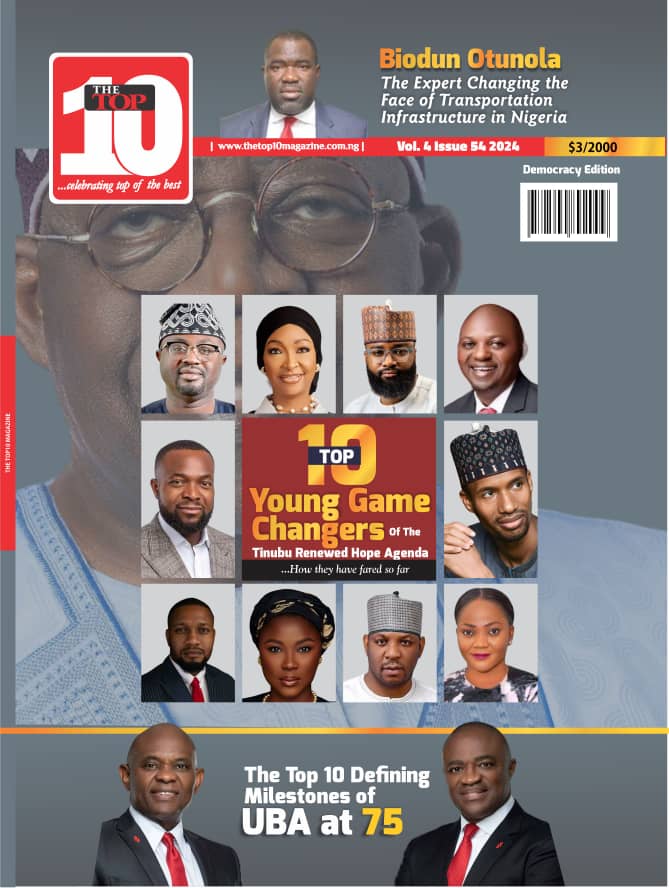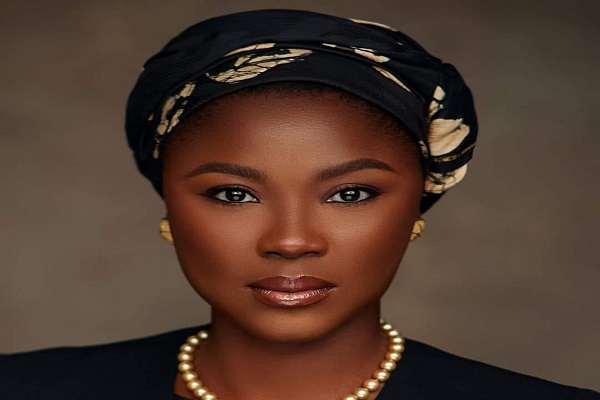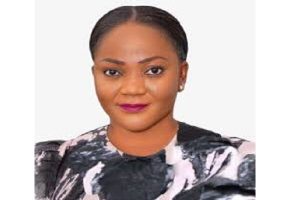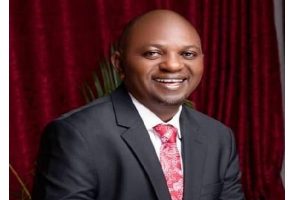By assigning Dr. Jamila Bio Ibrahim the youth development ministerial portfolio, President Bola Ahmed Tinubu has made it truly the ministry of youth by the youth and for the youth. Ibrahim was only 37 years old while the minister of state, Ayodele Olawande, was 34 at the time of their appointment in 2023, ranking them among the youngest members of the present Federal cabinet as well as, perhaps, the youngest ministers of youth.


Ibrahim, a medical doctor, who assumed office on Oct. 16, 2023, made it clear that her focus would be on diligently preparing a strategy that the youth could not only believe in but also rely upon in line with the administration’s Renewed Hope Agenda. The ministry’s vision for the youth, under her leadership, she declared, was not just ambitious but revolutionary, encompassing education, skills development, and empowerment across various sectors. Her starting point was the rebuilding of trust through thoughtful planning, transparent communication, and the delivery of tangible, impactful programmes.
Since assumption of office, Ibrahim has involved critical stakeholders within and outside the government to ensure the success of the President Bola Tinubu’s administration. In less than one year in office, she has logged an impressive list of achievements. One of them is the putting in place of modalities for the launch of NextGen Bank in April 2024. The bank was conceived as a retail development financial institution, a joint initiative with the Bank of Industry, private sector, and development partners, dedicated to empowering youth and youth-led ventures.
“It will provide grants, low interest loans, and equity investments, catalysing youth entrepreneurship in the agriculture, sustainable mining, green energy, sustainable mobility, blue economy, healthcare services, education and skill development, financial services, ICT and telecoms,” she explained.
The minister has also laid out plans for the establishment of youth villages, in partnership with states like Niger, Katsina, and Ebonyi; conceived to be sustainable communities —both physical and virtual —focusing on regional economic strengths.
The sustainable communities which will serve as hubs for economic, social, and political engagement, were expected to take off by the first quarter of this year. “This is apart from the planned rehabilitation of our Youth Development Centres across the country which will commence in earnest this year, 2024,’’ the minister disclosed.
The minister has got deeply involved in efforts to address the challenges of insecurity and poverty in the land. She noted that the young people who constitute over 70 per cent of our population are at the heart of these issues. According to her, the government’s significant expenditure on security and social intervention programmes could be more effectively channeled by providing opportunities for youths through education, empowerment, and engagement. The National Youth Investment Fund (NYIF) originally designed to fund youth-led ventures, plays a pivotal role in that, according to the minister.
She, noted, however, that NYIF had not fully met its objectives, prompting her to initiate a comprehensive review of the programme. She constituted a 13-member committee of experts to evaluate and propose a restructured and revitalised NYIF.
”The recommendations, which I plan to present for approval to the President, the Federal Executive Council, and, if necessary, to the National Assembly through a bill, will ensure the fund’s efficiency and impact.’’
According to the minister, one of her foremost objectives is to secure a commitment of at least two per cent of the Nation’s Consolidated Revenue to be annually allocated to the NYIF.

She said it would ensure a sustained and significant investment in the potential of the youth and, consequently, to the future of the nation. “I am convinced that an investment today will save the nation a fortune tomorrow; a stitch in time saves nine.’’
The minister has also initiated reforms in the National Youth Service Corps (NYSC) scheme, one of the major agencies under her ministry’s supervision. Ibrahim is redefining the NYSC scheme as a comprehensive empowerment platform, focusing on employability and entrepreneurship to ensure graduates transition into dignified employment or entrepreneurial ventures post service.
She has also initiated a skills programme for non-graduates and at-risk youths–extending the skill development mode of the NYSC programme. The minister explained that the initiative was aimed at empowering young Nigerians lacking formal education or skills.
Another significant stride by the minister towards cultivating a new echelon of visionary leaders is the Young Leaders’ Institute, which she is promoting. “We are announcing the inception of the Young Leaders’ Institute; modelled on the prestigious Aspen Institute; this initiative is uniquely tailored to the Nigerian context, offering an elite platform for leadership development. Admission to the Institute is a mark of distinction as it is solely by invitation.’’
According to her, the institute is more than an educational programme; it is a transformative journey that prepares the brightest young minds to lead with innovation, ethics, and a profound understanding of global challenges.
“As we launch the Young Leaders’ Institute, we invest not just in individual leaders but in the future of Nigeria and the world.
The Institute is scheduled to commence this institute in the 3rd quarter of 2024, with an inaugural abridged fellowship programme mostly for existing young Nigerians serving in government across the country. It will start bringing in participants from outside of government in 2025.
The minister has also proposed a mandatory 30 per cent youth quota in government appointments. This is seen as a landmark move towards empowering the youth and integrating them into the fabric of the nation’s governance and policymaking. “I am thrilled to announce the proposal of a 30 per cent youth quota in all government appointments,” she told pressmen. “This initiative, which I have presented to Tinubu, is designed to ensure that the voices, ideas, and energies of our youth are not just heard but are actively shaping the future of Nigeria.
“The youth represent the vibrant heart of our nation, and by embedding them within the decision-making processes of our government, we are not only acknowledging their importance but also harnessing their potential to contribute to national development,” she said.
The minister explained that the quota is crucial in reducing the gap between government and youth, addressing national security challenges through positive engagement, and building a governance structure representing the nation’s diverse and dynamic population. Ibrahim said she was committed to seeing that the proposal became a reality; marking a new era of youth empowerment and participation in the country.
Another initiative of the Youth Development ministry under Ibrahim’s leadership to equip young Nigerians with valuable skills is the Nigerian Youth Academy (NiYA). Spearheaded by the Minister of State, Olawande, this initiative seeks to ensure that every youth in Nigeria has, at least, two skills. Code-named “One youth, two skills, NiYA provides millions of young individuals across the country with access to a growing collection of online classes that can be taken at their own pace, from any location, and at any time.
Through the NiYA platform, participants have the opportunity to connect with subject matter experts in real-time, enabling them to enhance their learning experience on-the-go. This interactive approach allows for practical engagement and the development of essential skills for personal and professional growth.
Moreover, NiYA offers a digital community where participants can stay up-to-date on various opportunities and information relevant to boosting their careers and entrepreneurship prospects. The platform creates a space for networking, ideas sharing, and fostering collaborations among young Nigerians who are eager to make a positive impact in their respective fields.
Jamila Jummai Bio Ibrahim was born on February 7, 1986. Her father is Ibrahim Isa Bio, from Baruten LGA, Kwara state, who was a minister under the late President Umar Musa Yar’Adu’a.
Little Jamila Ibrahim attended NEPA Staff School in New-Bussa, Borgu LGA, Niger state, for her primary education. She proceeded to Federal Government Girls’ College, Bwari, Abuja, where she had her secondary education, and graduated in 2002.
She obtained a Bachelor of Medicine, and Bachelor of Surgery (M.B.B.S) from the University of Ilorin in 2010, and moved to the University of Washington for a six-month course on health management and leadership.
After her brief study stint in the US in 2017, Jamila Ibrahim established a non-governmental organisation (NGO) named Yon Seno Foundation in November of that same year. She was then named a member of the think-tank of the national policy summit in 2017.
She volunteered on the Presidential Committee on the North-East Initiative (PCNI) established by former President Muhammadu Buhari to serve as the primary national strategy, coordination and advisory body for all humanitarian interventions, and transformational and developmental efforts in the region.
Ibrahim worked with the PCNI for two years and “carried out an assessment of the major health facilities in Maiduguri, to ascertain the level of preparedness and identify the gaps in terms of manpower and mass casualty response. Shortly after that, she was named the secretary of the subcommittee on health, women affairs, population and environment of the transition committee of AbdulRahmanAbdulRasaq, Governor of Kwara, in 2019.
After completing her assignment in AbdulRasaq’s transition committee, Ibrahim was appointed the Senior Special Assistant to the Governor on Sustainable Development Goals (SDGs) a year later. She became Kwara’s focal person for both the National Human Capital Development Programme and the African Union Development Agency-New Partnership for Africa’s Development (AUDA-NEPAD).
She was also the Secretary of the Kwara state “tractorisation” programme and was thereafter named the National Vice President of the All Progressives Congress Young Women Forum (APC-PYWF) in June 2021.
Ahead of the 2023 elections, Ibrahim was appointed a member of the APC Presidential Campaign Committee on Sustainable Development.
The minister is an avid fan of Polo and a non-executive director of the Emirates Equestrian Club, Ilorin.






